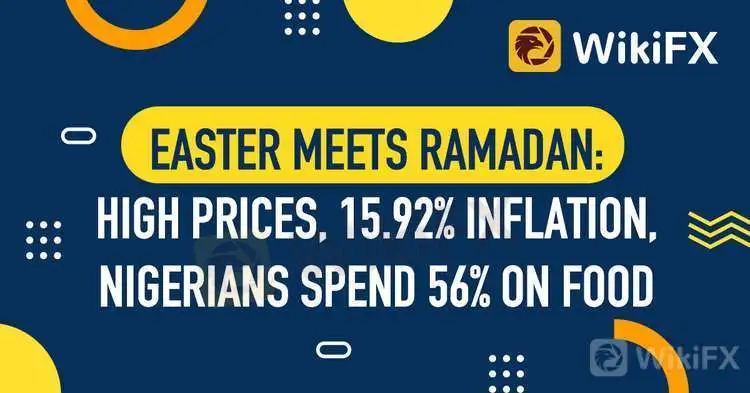EASTER MEETS RAMADAN: HIGH PRICES, 15.92% INFLATION, NIGERIANS SPEND 56% ON FOOD
Abstract:The global rise in food prices is weighing on emerging and developing economies, and Nigerians are now spending more than 56% of their total income on food, as food inflation in the country approaches 18% after printing 17.20% year on year in March 2022, according to current National Bureau of Statistics (NBS) figures.

The global rise in food prices is weighing on emerging and developing economies, and Nigerians are now spending more than 56% of their total income on food, as food inflation in the country approaches 18% after printing 17.20% year on year in March 2022, according to current National Bureau of Statistics (NBS) figures.
Between 2020 and 2022, average commodity prices in Nigeria increased by about 127%, reflecting the reality on the ground, with consumers remaining strained, pinched, and beleaguered at a time when official inflation is at 15.92%, climbing for the third consecutive month in 2022. Nigerians' purchasing power continues to be undermined by the naira's ongoing depreciation, a pressure that is unrelenting, with the indigenous currency presently selling at around N600 to the dollar on the parallel market.
The ongoing conflict between Ukraine and Russia, which is now registering in the nation, is putting pressure on local commodities prices.
It is an election year, and analysts have predicted that election spending will fuel inflationary pressures and squeeze the pockets of ordinary Nigerians. While inflation figures may gradually rise or fall, consumer goods prices will continue to see demand and cost pull inflation in the face of current realities in Nigeria.
According to analysts at Financial Derivatives Company Limited, “it is disheartening that five of Nigeria's seven biggest import partners are battling with growing inflation while critical import commodity prices have risen dramatically.” Food contributes to 20% of consumer spending in developing markets, up to 40% in Sub-Saharan Africa, and 56% in Nigeria. Food price increases have aggravated existing macroeconomic challenges in several emerging nations, which are dealing with high debt levels, currency constraints, and inflation.
According to Afrinvest Research and Consulting, “food inflation jumped 25 basis points to 1.9% month on month in February due to continued insecurity concerns in rural areas and the impact of [the] Russian-Ukraine situation on wheat and corn prices.” Similarly, core inflation increased by 8 basis points to 1.3% month on month as PMS shortages pushed up costs. We expect these variables to continue impacting price trajectory in March, and as a result, we forecast that headline inflation will climb to 15.73% year on year. It outperformed this posting by 15.92%.
Following the blues of December 2021, which brought the annual inflation average to 17% with the headline inflation index changing direction to 15.4% year on year following the decelerations recorded in the previous 8 months, 2022 began with an upward trend in the numbers and, for the third consecutive month, the headline inflation in Nigeria printed at 15.92% year on year in March 2022 due to price increase expectations in the month ahead of Ramadan.
According to the NBS inflation data, food inflation in March was highest in Kogi at 22.21%, followed by Cross River at 19.86% and Kwara at 19.53%, while Sokoto had the slowest rise in year-on-year food inflation at 14.04%, followed by Kaduna and Rivers at 14.66% and 14.81%, respectively.
Pressures from the upcoming elections are already expected to result in higher inflation numbers, and with the economy grappling with unemployment, low revenue, insecurity, a weak naira, slow output growth challenges, global inflation, supply disruptions, and climate shocks, the average Nigerian will still be in pole position to experience the looming effect, which is likely to place Nigerians in their millions back into poverty if fiscal and monetary policymakers do nothing.

Related broker





Read more

Effective Stop Loss Trading Strategies
In a forex market where fundamental and technical factors impact the currency pair prices, volatility is expected. If the price volatility acts against the speculation made by traders, it can result in significant losses for them. This is where a stop-loss order comes to their rescue. It is one of the vital investment risk management tools that traders can use to limit potential downside as markets get volatile. Read on as we share its definition and several strategies you should consider to remain calm even as markets go crazy.

1Prime options Review: Examining Fund Scam & Trade Manipulation Allegations
Did you find trading with 1Prime options fraudulent? Were your funds scammed while trading on the broker’s platform? Did you witness unfair spreads and non-transparent fees on the platform? Was your forex trading account blocked by the broker despite successful verification? These are some issues that make the traders’ experience not-so memorable. In this 1Prime options review article, we have investigated the broker in light of several complaints. Keep reading!

EXTREDE Review (2026): A Complete Look at the Serious Warning Signs
This EXTREDE Review serves an important purpose: to examine the big differences between what the broker advertises and what we can actually prove. For any trader thinking about using this platform, the main question is about safety and whether it's legitimate. We will give you a clear answer right away. Our independent research, backed up by third-party information, shows that EXTREDE operates without proper regulation, creating a high-risk situation for all investors. The main focus of this investigation is the absolutely important need to check a broker's claims before investing. A broker's website is a marketing tool; it cannot replace doing your own research. The information that EXTREDE presents contains contradictions that every potential user must know about. A quick way to see these warnings gathered together is by checking the broker's live profile on verification platforms. For example, the EXTREDE page on WikiFX brings together regulatory status, user feedback and expert ri

Eurotrader Review: Safe Broker or Risky Choice?
Eurotrader is regulated by CYSEC & FSCA, offering MT4/5 with forex and CFDs. Safe broker or risky choice? Review facts and decide now via the WikiFX App.
WikiFX Broker
Latest News
Copy-Paste Broker Scams: How Template Websites Are Used to Impersonate Regulated FX Firms
BP PRIME Review: Safe Broker or Risky Broker
EXTREDE Review (2026): A Complete Look at the Serious Warning Signs
Promised 30% Returns, Lost RM630,000 Instead
You Keep Blowing Accounts Because Nobody Taught You This
HTFX Review: Safety, Regulation & Forex Trading Details
Effective Stop Loss Trading Strategies
Q4 GDP Unexpectedly Grows At 1.4%, Half Expected Pace, As Government Shutdown Hits Q4 Growth
Q4 GDP Unexpectedly Grows At 1.4%, Half Expected Pace, As Government Shutdown Slams Growth
Pepperstone Review: Regulation, Licences and WikiScore Analysis
Rate Calc
